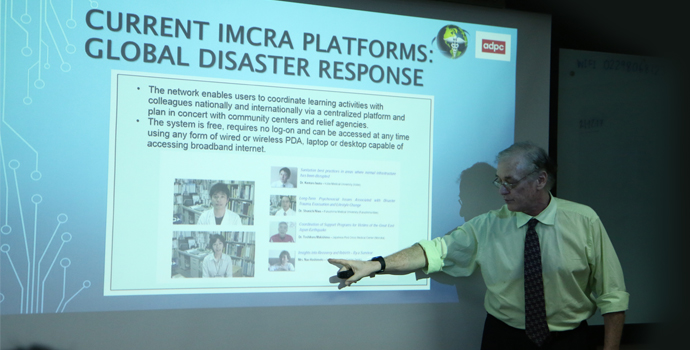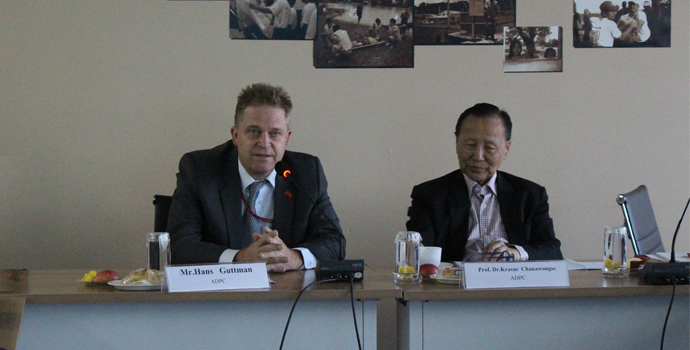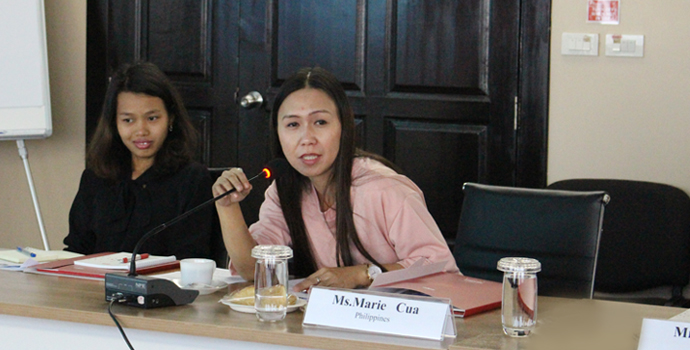- About Us
-
Who we are
-
- Publications
-
- ADPC Academy
-
MediaADPC'S NEWS
First aid through phones – ADPC discusses with PIVAT Conclave First aid through phones – ADPC discusses with PIVAT Conclave
18 - 19 Jan 2018
Bangkok, Thailand

Dr. Thomas Hedberg from the International Medical Crisis Response Alliance (IMCRA) gives a presentation
Despite the fast economic growth in the region, a large proportion of Asia and the Pacific still remains rural and thus face acute health issues, particularly during emergencies in remote and hard-to-reach areas. Even in cities, qualified medical assistance is not instantaneous, and the valuable seconds it takes to save a life may be put to waste. In many cases, individuals have tragically lost their lives, often unnecessarily, because they were not administered lifesaving procedures which could have prevented death.
This tragedy stems primarily from people’s lack of knowledge of basic first aid and interventional knowledge. Either witnesses try in vain to resuscitate an injured person using incorrect methods or they simply observe and refuse to intervene out of fear of making matters worse. Addressing these issues can potentially save countless lives.

Mr. Hans Guttman, Executive Director of ADPC (left), and Prof. Dr. Krasae Chanawongse, Chairman of the ADPC Board, were present during the discussions
Recognizing these shortcomings, ADPC, along with other members of the International PIVAT (Prompt Interventional Volunteer 1st Aid Tutorials) Conclave, seek to address the issues by finding a way to easily relay effective interventional knowledge to common people and bystanders to give them the capacity to respond to medical emergencies. On 18-19 January, the conclave convened a meeting in Bangkok to discuss specific emergency needs of the represented nations involved in the program. The conclave aims to establish the PIVAT program wherein regular individuals can access short videos on first aid modules.During the meeting, members covered a number of considerations to reflect upon to solidify the foundations of the project. One of these were the types of emergencies that prompt these crises, which include gang violence, accidents, health issues, and venomous bites. They also covered common challenges amid these emergencies, which include spectators who may have the heart to help with limited knowledge on what to do as well as the lack of availability, accessibility, affordability of basic knowledge and facilities.

Ms. Marie Cua from IMCRA shares her insights during the discussions
Legal implications were also covered during the discussions, and members have established that progressive laws encouraging ‘Good Samaritan’, alongside the dissemination of first aid modules, can encourage individuals to provide assistance during emergencies and therefore save lives.
The conclave also came up with ideas on how to ensure that individuals, regardless of whether they live in rural or urban areas, have the capacity to enact lifesaving procedures to those in need. This could be best addressed through a mobile application, available in multiple local languages, which outlines the proper procedures in response to several emergencies. It was also agreed that this content should be available offline so that its contents can be accessed at any time.
The International PIVAT Conclave will continue to engage in further discussions on the implementation of this project, including the promotion of the application, human resources, and the materials that will be covered in the application.
Latest NewsRelated Trainings
-